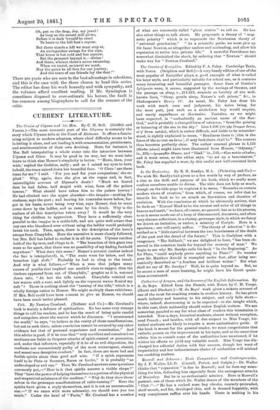CURRENT LITERATURE.
The Cruise of Ulysses and his Men. By C. M. Bell. (Griffith and Farran.)—The most romantic part of the Odyssey is certainly the story which Ulysses tells at the Court of Alcinous. It offers a fascin- ating subject to modern adapters, whose chief difficulty seems to be in letting it alone, and not loading it with ornamentation, prettinesses, and sentimentalities of their own devising. Here, for instance, is Mrs. Bell interpolating a whole scene into the interview between Ulysses and Circe. It may be good in its way, but we must take leave to think that Homer's simplicity is better. "'Have, then, your wish,' replied the Goddess, sadly ; and as I raised my eyes to hers, behold, the tears rained down her beautiful face. 0 Circe ! are these tears for me ?' I said. For you and for your companions,' she re- plied." Why, again, does she give us the vague and, in fact, unintelligible account of Elpenor's death ? "Mach we feared -that he had fallen, half stupid with wine, from off the palace towers." What should have taken him to the palace towers ? He had climbed into the upper .chamber—the Utripaisv—seeking for coolness, says the poet ; and hearing his comrades move below, for- got in his haste, never being very wise, says Homer, that he must come down by the ladder, and so came by his death. Why is the realism of all this description taken away ? It would be the very thing for children to appreciate. They have a sufficiently close parallel to the birepiiov in a stable-loft, and are quite well aware that any one who blundered over without using the ladder would probably break his neck. Then, again, there is the description of the hero's escape from Charybdis. Here the narrative is more closely followed, but Mrs. Bell has failed to realise it in all its parts. Ulysses catches hold of the fig-tree, and clings to it. "The branches of this giant tree were so far apart, that there was no possibility of my finding foothold anywhere." What does this mean ? Homer's account (unless indeed the line is interpolated), is, "The roots were far below, and the branches high aloft." Probably he had to cling to the trunk. And why is what follows,—" When a man that judges many causes of youths that implead one another rises to supper, then the timbers appeared from out of Charybdis," graphic as it is, watered down into, "At last the tide turned. Charybdis vomited out her waters with a roar, and, lightly on the topmost waves floated my raft "? There is nothing about the "turning of the tide," which is a wholly foreign notion to Homer. We might multiply these criticisms. If Mrs. Bell could have been content to give us Homer, we should have been much better pleased.






























 Previous page
Previous page